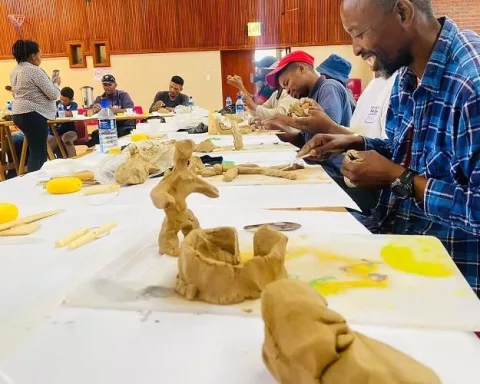Thapelo Edwin Mojaki, a 41-year-old man from North West, South Africa, was recently sentenced to life imprisonment for murdering his pregnant wife, an incident that highlights the ongoing struggle against gender-based violence (GBV). The tragic event took place on October 9, 2022, in Kolong village near Taung, forever changing the lives of the couple’s two teenage children.
The Incident
Matshidiso Catherine Mojaki, aged 36, was on her way to catch a taxi to work, accompanied by her 16 and 18-year-old children when Thapelo approached her, asking for money. When she replied that she had no money, he resorted to a shocking act of violence. Using sheep shearing scissors, he brutally stabbed Matshidiso several times, ultimately resulting in her death.
The Court Case
Thapelo was arrested the following day and denied bail. The Taung Regional Court found him guilty, with the state prosecutor, Tecia Khula, urging the court not to deviate from the prescribed minimum sentence. The court emphasized the severity of Thapelo’s actions and the lack of compelling circumstances for leniency.
The Outcome
Magistrate Buti Zulu agreed with the prosecution’s assessment and stated that Thapelo had a responsibility to protect his family, rather than perpetrate acts of violence against them. In response to the life sentence, the Director of Public Prosecutions in the North West, Dr. Rachel Makhari, and the Provincial Commissioner, Lieutenant General Sello Kwena, applauded the Taung prosecution team for successfully bringing justice to the case.
The Issue of Gender-Based Violence
The gruesome murder of Matshidiso Mojaki highlights the persistent issue of gender-based violence and femicide globally. The response of the prosecution, law enforcement, and the courts in this case can be seen as a step toward increased advocacy against GBV and a commitment to securing justice for the victims and their families.
The Fight Against GBV
The fight against GBV requires a comprehensive, society-wide effort to address the root causes of such violence, challenge the attitudes and beliefs that perpetuate it, and provide support for victims and their families. Although the legal system has a crucial role to play in deterring and punishing acts of GBV, it is only one component of a larger, multifaceted approach to tackling this pervasive problem.
The Call to Action
The tragedy of the Mojaki family serves as a stark reminder of the human cost of gender-based violence, highlighting the need for continued efforts to confront and overcome the scourge of GBV. Through education, public awareness campaigns, and community-based initiatives, we can work together to create a safer, more equitable society in which individuals can live free from fear and violence.
In the end, the life sentence handed down to Thapelo Edwin Mojaki not only reflects the gravity of his actions but also serves as a rallying call for continued efforts to confront and overcome the scourge of gender-based violence. It is a somber reminder that the work to create a just and compassionate society is far from over, and vigilance is necessary to ensure that future tragedies are averted.












